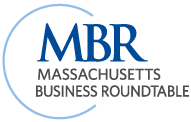Roundtable Members Share Reflections on Workforce Dynamics
Last week, the Roundtable hosted our monthly Open Forum to discuss current workforce issues facing employers as part of the Roundtable’s Future of Talent and Competitiveness Survey. The discussion included live pulse polls and surfaced several themes that employers are grappling with in their workforce including hybrid work models, generational differences in the workforce, and talent attraction and retention efforts as well as the state’s overall competitiveness and the challenges posed by the high cost of living.
The discussion was facilitated by Roundtable member and knowledge partner McKinsey and Company as part of the Roundtable’s Future of Talent and Competitiveness Survey. Now in its third year, this survey has become a key barometer of the Massachusetts business climate. As part of the data collection process, members shared live feedback about the trends they are seeing in their workforce, and its implications for the state’s competitiveness. While the survey results will not be released until May, here are a few initial reflections we heard in this conversation of nearly 50 members:
1) Talent: Attracting and retaining talent continues to be a pain point and the top issue facing employers. When asked, “what is the biggest challenge when it comes to acquiring talent?”, 78% of members chose “attracting the talent we need and want.” Drivers include the state’s high cost of living, lack of “roots” in companies as a result of remote and hybrid work, and the changing expectations of employees in areas such as flexible work schedules and salary. This has led employers to have an increased focus on talent outside of Massachusetts, providing a broader geographic area to fill workforce gaps.
2) Working Models: The challenges of hybrid working models continue, highlighted by intergenerational differences in the workplace and changing and unclear expectations particularly in the definition of “flexibility.” When asked, “what is the biggest challenge when it comes to your existing talent?”
- 38% selected retaining top talent;
- 31% selected managing a hybrid workforce;
- 19% selected upskilling/reskilling your workforce to meet needs; and
- 12% selected managing an intergenerational workforce.
Employers are struggling with building and maintaining a productive workplace culture, how to employ mentoring and knowledge transfer strategies, and balancing the requirement of in-person presence with the risk of losing talent. Hybrid work expands the talent recruitment pool to “anywhere,” again highlighting the challenge of recruiting and retaining talent in Massachusetts. One member stated, “top talent is hybrid and intergenerational,” capturing the variety of dynamics employers are managing in their workforce.
3) Competitiveness: Anxiety about the future of the state was prevalent, particularly citing the outmigration of workers, the ability to attract talent to Massachusetts, and the high costs of living and doing business. While Massachusetts has several competitive advantages including excellent schools and a supportive social environment that is attractive to workers, the cost of living and affordability of the state is impacting workers’ ability to stay in Massachusetts.
This discussion captures some of the current trends we are hearing from our members and underscores the importance of the Roundtable’s agenda to invest in the state’s talent in order to advance the state’s competitiveness. The Roundtable will publish the results of its Future of Talent and Competitiveness Survey later this spring.
RECENT POSTS
- Quarterly Policy Roundup: Q1 2024
- Black History Month: Reflections from Roundtable Staff
- Roundtable Members Discuss Impact of Business on Society
- Quarterly Policy Roundup: Q3 2023
- What We Heard This Summer in Our Roundtable Member Meetings
- Health Equity in Massachusetts and Why it Matters
- Growing MA’s Labor Market: Why Immigrants Should be Part of the Solution
- Massachusetts’ Future of Energy
- Roundtable Members Share Reflections on Workforce Dynamics
- Quarterly Policy Roundup: Q1 2023
